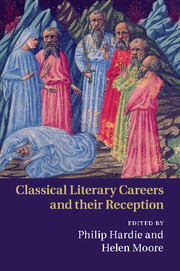Book contents
- Frontmatter
- Contents
- List of contributors
- Preface
- Note on the text
- Introduction: Literary careers – Classical models and their receptions
- 1 Some Virgilian unities
- 2 There and back again: Horace's poetic career
- 3 The Ovidian career model: Ovid, Gallus, Apuleius, Boccaccio
- 4 An elegist's career: from Cynthia to Cornelia
- 5 Persona and satiric career in Juvenal
- 6 The indistinct literary careers of Cicero and Pliny the Younger
- 7 Re-inventing Virgil's Wheel: the poet and his work from Dante to Petrarch
- 8 Did Shakespeare have a literary career?
- 9 New spins on old rotas: Virgil, Ovid, Milton
- 10 Bookburning and the poetic deathbed: the legacy of Virgil
- 11 Literary afterlives: metempsychosis from Ennius to Jorge Luis Borges
- 12 ‘Mirrored doubles’: Andrew Marvell, the remaking of poetry and the poet's career
- 13 Dryden and the complete career
- 14 Goethe's elegiac sabbatical
- 15 Wordsworth's career prospects: ‘peculiar language’ and public epigraphs
- Epilogue: Inventing a life – a personal view of literary careers
- List of works cited
- Index
8 - Did Shakespeare have a literary career?
Published online by Cambridge University Press: 10 November 2010
- Frontmatter
- Contents
- List of contributors
- Preface
- Note on the text
- Introduction: Literary careers – Classical models and their receptions
- 1 Some Virgilian unities
- 2 There and back again: Horace's poetic career
- 3 The Ovidian career model: Ovid, Gallus, Apuleius, Boccaccio
- 4 An elegist's career: from Cynthia to Cornelia
- 5 Persona and satiric career in Juvenal
- 6 The indistinct literary careers of Cicero and Pliny the Younger
- 7 Re-inventing Virgil's Wheel: the poet and his work from Dante to Petrarch
- 8 Did Shakespeare have a literary career?
- 9 New spins on old rotas: Virgil, Ovid, Milton
- 10 Bookburning and the poetic deathbed: the legacy of Virgil
- 11 Literary afterlives: metempsychosis from Ennius to Jorge Luis Borges
- 12 ‘Mirrored doubles’: Andrew Marvell, the remaking of poetry and the poet's career
- 13 Dryden and the complete career
- 14 Goethe's elegiac sabbatical
- 15 Wordsworth's career prospects: ‘peculiar language’ and public epigraphs
- Epilogue: Inventing a life – a personal view of literary careers
- List of works cited
- Index
Summary
Among the authors addressed in this volume, William Shakespeare is something of a special case: he alone is thought to lack a ‘literary career’. Unlike Virgil and Horace, or Petrarch and Boccaccio, or Milton and Dryden, Shakespeare is thought to have a ‘professional career’: he is a man of the theatre, a jobbing playwright, a consummate actor and a savvy shareholder of an acting company, too preoccupied with the daily business of his new commercial enterprise to take an interest in the literary goals of English authorship. Only during the past few years, however, have we detached ourselves enough from this twentieth-century classification to recognize it as a classification, a critical construction of ‘Shakespeare’ born out of specific temporal origins, with its own location in history. That history, we shall see, is less Shakespeare's than our own. Even so, we need to begin with it because so many critics continue to subscribe to it. Indeed, during the past century many were intent to announce this classification as a seminal achievement, and we may single out two primary movements that coalesced to create it.
The first is theatrical, which Harry Levin summarizes in an important 1986 essay: ‘Our century has restored our perception of him to his genre, the drama, enhanced by increasing historical knowledge alongside the live tradition of the performing arts.’ Levin is reacting to the Restoration, Augustan, Romantic and Victorian reduction of Shakespeare's theatrical art to what John Dryden called in 1668 ‘Dramatick Poesie’.
- Type
- Chapter
- Information
- Classical Literary Careers and their Reception , pp. 160 - 178Publisher: Cambridge University PressPrint publication year: 2010



